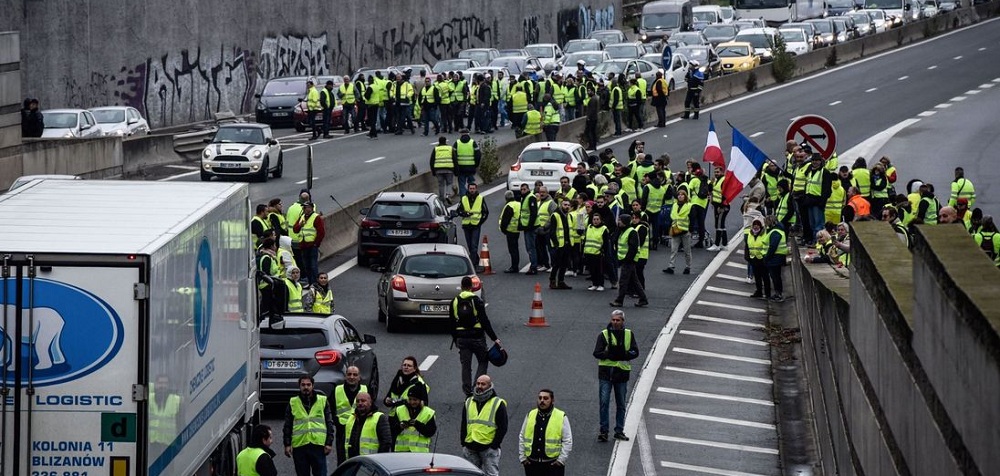Alwaght- New wave of protests against the French government's economic policies has started on Saturday and is spreading fast across the country, putting the liberal government of President Immanuel Macron face to face with a serious challenge.
According to the result of polls carried out by IFOP, a French opinion institute, Macron’s popularity is now 25 percent, the lowest level since he took office in May 2017.
The demonstrators, in yellow vests blocked the major link roads across the county on November 17. The protestors also tried to close the roads leading to some of the tourist sites like Disneyland Paris theme park but the police forces deployed to the area prevented them from doing so.
Additionally, some of the protestors drove very slowly their cars in the highways in what they called “snail” protest, causing a huge traffic jam. Such protest measures have taken place in more than 30 points of the country, with the slow movement of the vehicles in the highways continuing up until Sunday noon.
The police and security forces' confrontation with the demonstrators slipped into violence. According to the Interior Minister Christophe Castaner, since the beginning day of the protests, 282 people were arrested, 400 were injured, and one was killed.
Demonstrations: Causes and demands
The price of diesel, the most commonly used fuel in French cars, has risen by around 23 percent over the past 12 months to an average of €1.51 ($1.71) per liter, its highest point since the early 2000s, AFP news agency reported.
The government has decided to impose a further increase of 6.5 cents on diesel and 2.9 cents on petrol on January 1, 2019. The yellow vests, who are mainly middle-classers, are extremely worried about the consequences which could include a drop in their buying power and lower living standards.
The government of Macron has been pursuing austerity policies and cutting its spending while increasing the taxes. This was the dominant approach of Macron since he became president to weather the economic crisis.
In early October the National Institute of Statistics and Economic Studies (Insee), announced that the national budget deficit hit the €97.3 billion ($111.2 billion) by August 2018, showing a €4.3 billion ($4.9 billion) increase compared to the year before. The austerity policies naturally negatively reflect on the social welfare and at the end of the road, the middle and low-class people will sustain the biggest blow, something triggered massive demonstrations over the past few months by the labor unions.
The country has been a scene to protests against the government policies since March as the government introduced pay cuts to the railroad workers, privatized the public services, and competitivized and limited the entry to state universities. In June, tens of thousands of French people joined the “peoples movement” demonstrations. The protests were organized in Paris, Marseilles, Lyon, and several other French cities. The protestors chanted against the economic reforms of Macron and in some cases, the police intervention led to violence. In Paris and Lyon police fired tear gas to disperse the rallies. In Nantes, in the west of the country, the anti-protest security forces used water cannons against the anti-capitalism demonstrators.
The opposition role
Macron has accused his political opponents of exploiting the yellow vest movement against him in a bid to set up obstacles ahead of his economic reforms program.
His opponents certainly tried to exploit what is happening on the ground. Some of the big parties' leaders have been supportive of the protests. What makes this round of protests different from the past ones is the accentuation of the role of the right-winger Marin Le Pen, the National Front leader. The present rallies come while the June protests came following a call by the anti-government and mainly leftist groups like La France Insoumise (Unsubmissive France), led by Jean-Luk Mélenchon. These groups dubbed their protests “anti-fascist”.
Marine Le Pen in a Twitter post announced support for the rallies and warned the government of using force to disperse the protestors. In addition to Le Pen, Mélenchon, and also Oliver Faure, the First Secretary of the Social Party of France, have blasted Macron's economic policies and voiced their backing to the protests.
People, who nearly two years ago, voted to Immanuel Macron in hope of economic improvement and even obtaining the leadership of the Continent, now accuse the government of failing to accomplish his campaign-time promises and argue that his reform plans have compounded the economic situation. Now we should wait and see if Macron can weather the crisis with only a 25 percent popularity rate.



























